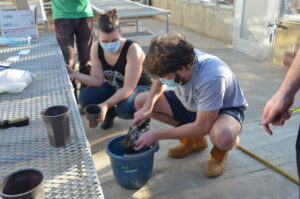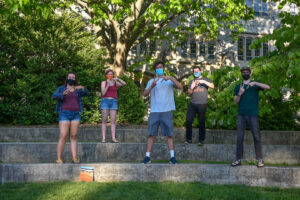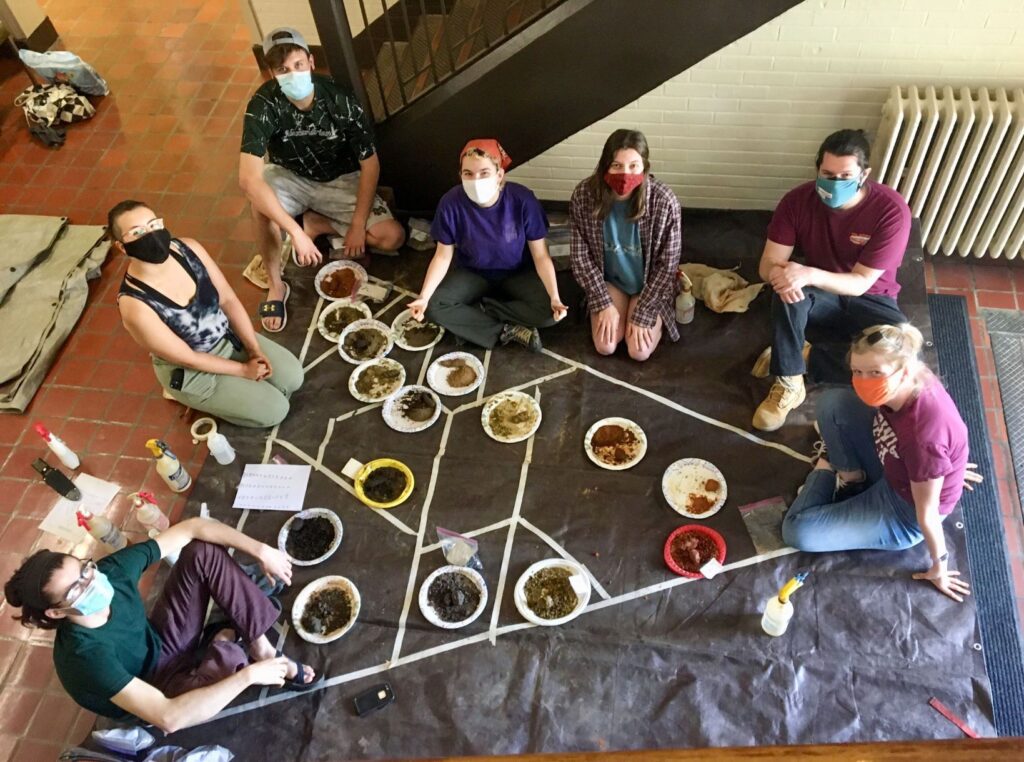Top-ranked Virginia Tech Soil Judging team lead by PhD student and soil scientist Jacqlyn Fiola was looking for a challenge this year with the normal competition paused by COVID-19. Active in soil judging programs at University of Maryland and Ohio State, Fiola is committed to providing opportunities at Virginia Tech.
Fiola came across the NASA Plant the Moon Challenge on Twitter and immediately signed up the team. The Challenge offered an opportunity for a team building, hands-on project, a rarity in this COVID environment. The challenge: successfully grow crops using a moon soil.
 Immediately, as students started discussions and consultations, they thought of Matt Damon and The Martian, to use biosolids (poop) to add nutrients to the stimulant! Treated biosolids are easy to transport in a rocket ship to bring to the moon and to use. And, as soil scientists, team members were appreciative of the texture and minimal to no odor, making biosolids an easy product to use. Similarly, to tackle the problem of pH, powdered vinegar was the solution. The surprise….. the biosolids turned out to lower pH too! The stimulant pH of 9 was lowered to nearly 7.5 pH with the applications of both the biosolids and powdered vinegar.
Immediately, as students started discussions and consultations, they thought of Matt Damon and The Martian, to use biosolids (poop) to add nutrients to the stimulant! Treated biosolids are easy to transport in a rocket ship to bring to the moon and to use. And, as soil scientists, team members were appreciative of the texture and minimal to no odor, making biosolids an easy product to use. Similarly, to tackle the problem of pH, powdered vinegar was the solution. The surprise….. the biosolids turned out to lower pH too! The stimulant pH of 9 was lowered to nearly 7.5 pH with the applications of both the biosolids and powdered vinegar.
Having a variety of backgrounds (environmental science, agronomics, mechanical engineering, biologic systems), each Plant the Moon team member offered different skills and worked together with great enthusiasm to determine what soil is, lunar simulant, and how you manipulate pH and add nutrients. They also reached out and took advantage of experts within the VT community, including research on lunar/martian soils, greenhouses, and plants, biosolids, all to determine what to plant. Ultimately, they decided upon a mission of turnips, a cold weather crop of which the most biomass could be used.
While their crop of turnips was doing incredibly well in their allotted 100 days, a spell of warm weather and a failure of A/C led to an Apollo 13 moment. They are now in their second round – with a promising crop and rewards for all their efforts.
Simultaneous to the Plant the Moon Challenge, the soil judging team also came in first in the 2021 National Contest, successfully identifying texture, photos, interpreting descriptions, and classifying soils. 
Clare Tallamy from the Virginia Tech Soil Judging team said “working on the Plant the Moon project was something that kept me connected to my program as well as something that further sparked my interest in soil science! I had a ton of fun researching elements of the experimental design and learning along the way.” Tallamy continued, “I think that this project was important not only for keeping us interested during another pandemic semester, but it also introduced us to how scientists are solving the big problems that our population faces.”
Fiola is incredibly proud of her students and team, including: Alex Greehan, Sarah Price, Bernie Frantz, Kathlynn Lewis, Tessa Naughton-Rockwell, Michael Russell, Clare Tallamy, Lisa Small, & Andrew Sanregret. The team was mentored by Fiola and Dr. John Galbraith. She credits their research, diligent work, and commitment to their success on both projects.
